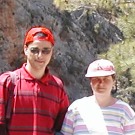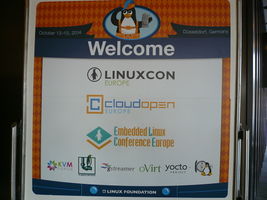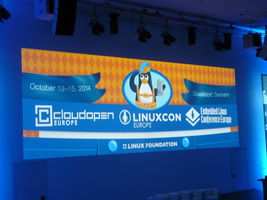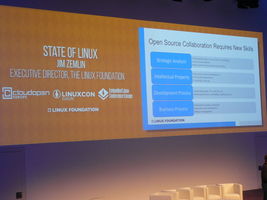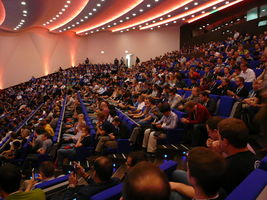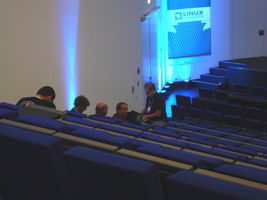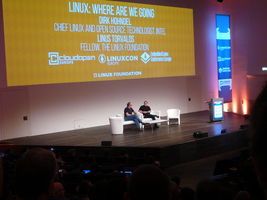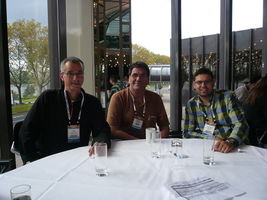LinuxCon Europe 2014
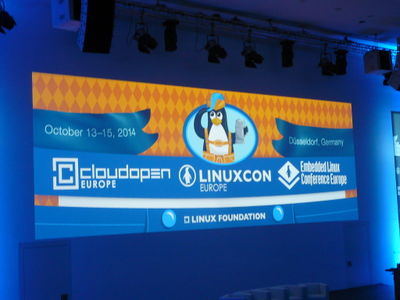
This page is to share my personal experiences of the LinuxCon Europe 2014.
Background
Since the LinuxCon Europe 2014 was held in Düsseldorf, which is the location where I am working within the headquarter of Ericsson Germany, the chance was really unique to participate and to book a seat. I am a Linux and Open Source enthusiast since almost 20 years and - as solution architect - use these Open Source technologies as much as possible in my small area of customer projects and even exclusively in my private life. I strongly believe in the power of Open Source and the other "Open" trends within our society, like Open Data.
The LinuxCon is not just for software and hardware developers, it's really a great event to get in touch with the Open Source community, with new information technology trends and with actual ways of working (agile methods like DevOps). It also covers things like making the most of communities and collaboration (also within your own company). And it even touches law topics and regulations (e.g. patents, licensing, IPR, ...).
About 2000 people attended and many global players but also smaller companies participated in giving key notes and providing speakers for the sessions.
My schedule and experiences
Key Notes
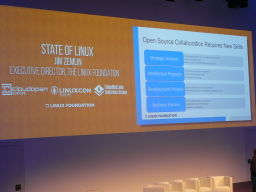
The key notes on all three days were related to common Linux and Open Source topics. My favorites were:
- State of Linux - Jim Zemlin, The Linux Foundation
- How Open Source Communities are Improving the Health of the Poor - Paul Biondich, Founder and President of OpenMRS
- Building Exponential Communities - Jono Bacon, Senior Director of Community at XPRIZE
- The Service Enabling Wireless Network - Anthony C. K. Soong, Chief Scientist for Wireless Research and Standards at Huawei Technologies Co. Ltd
- Giving private clouds public capabilities - Frank Karlitschek, ownCloud
- Alien Life Forms: Communities, Enterprises and All the Rest - Olaf Kirch, Director SUSE Linux Enterprise
- Linux: Where Are We Going - Dirk Hohndel, Chief Linux and Open Source Technologist, Intel and Linus Torvalds, Fellow, The Linux Foundation (Video)
The most impressive key notes were from Jim Zemlin (Linux Foundation) and the talk with Linux Torvalds, of course. Jim's Conclusion: Open Source starts to dominate the complete ICT business. Jim also outlined a very important and valid list of skills, people and companies need to successfully collaborate on Open Source projects, see this slide. See also his quite similar speak at LinuxCon North America 2014.
Sessions
After the key notes a lot of sessions were offered like workshops, presentations and round table discussions. Each of these sessions covered a certain topic of interest. There were even up to 6 or more sessions in parallel, so it was not even possible to attend to all interesting ones.
Main topics were grouped into:
- Linux kernel
- Cloud Computing
- Virtualization
- Container (LXC, Docker)
- Continous Integration (CI)
- DevOps
- Configuration Management
- Collaboration
- Open Source Communities
- Legal issues
- ... and more
I attended to following sessions:
- Is SSH Really Secure? - Peter Tornberg, Fox Technologies
- Best Practices for MySQL High Availability - Colin Charles, SkySQL
- LXC and Why System Containers Matter Too - Stéphane Graber, Canonical Ltd.
- GitLab as an Alternative Development Platform for Github.com - Ralf Lang, B1 Systems GmbH
- NFV for Beginners - Dave Neary, Red Hat
- Overcoming Obstacles to Contributing to Linux - Tim Bird, Sony Mobile
- GitHub + F/OSS => 1 Million SPDX - Nuno Brito, TripleCheck
- Building a DevOps PaaS with Docker, CoreOS, and Apache Stratos - Lakmal Warusawithana, WSO2 Inc
- Continuous Integration Using Docker & Jenkins - Mattias Giese, B1 Systems GmbH
- Using Docker Containers as Your Admin Toolbox - Karanbir Singh, CentOS
- Collaboration Beyond Development - Co-opetition and the Long Game - Shane Coughlan, OIN
- Empowering Your Corporate OSS Developers - Jono Bacon, XPRIZE; Dawn Foster, PuppetLabs; Leslie Hawthorn, Elasticsearch; Richard Morrell, Red Hat; Moderated by Guy Martin, Samsung
Well, two after-work community sessions need to be noticed here as well:
- Onsite Demo Reception & Booth Crawl: Some local Altbier and Bratwurst on Tuesday
- All-Attendee Reception: Food and drinks at the Nachtresidenz on Wednesday
My notes
Monday
- Key Note Jim: Prepare for Open Source blockbuster
- MySQL
- Global Transaction ID (GTID)
- Percona Toolkit for Monitoring
- Galera Cluster in MariaDB 10.1 !
- MHA: Tool for Failover/HA/Replication stuff
- or mysqlfailover
- or MySQL Fabric coming soon
- Spider in MariaDB 10.0
- GitLab
- merge request via GUI or API
- fork to own namespace
- merge request to main project
- comment inline (for feedback)
- accept / revoke
- API: ticketing, GitLab CI, Jenkins
- Access Control: highest wins
- rake command for Git gc
- merge request via GUI or API
Tuesday
- Key Note Tue: Building Communities
- Book: The Art of Communities
- NFV for beginners
- Network Functions Virtualization
- Open Source as key enabler + SDN + Cloud computing
- http://opnfv.org
- SPDX
- http://spdx.org
- Finds licenses
- SPDX in source code header
- other Tools Github.com/pivotal/LicenseFinder
- CI using Docker and Jenkins
- Fig as Docker management tool
- GitLab plugin
- SSH plugin
- Use Cases:
- Testing code or config changes in Docker containers via Jenkins , Tools "service spec"
- Integration and Deployment, testing Docker Image changes
- litmus WebDAV Test tool
Wednesday
- Docker Containers as Admin Toolbox
- Tools live within container, do not need to be uninstalled after usage. No need to install sysadmin tools on all the machines.
- Device Mapping into container.
- Network interface mapping or just the complete networking environment,
docker run -ti --net=host centos /bin/bash
- Add/Remove privileges
--cap-add=NET_ADMIN centos /bin/bash ip add route ...
- Sysmonitoring with "oprofile" (stats about system usage, identify bottlenecks and processes using which resources,...)
- Root fs can' t be mounted, but workaround:
-v /tgt:/mnt
- Systemd can also be touched
- easyDocker Tool
- Collaboration projects, OIN
- Business decisions important
- Empowering Your Corporate OSS Developers
- very interesting insights in how people get involved in Open Source
Image Gallery
-
Welcome
-
The LinuxCon wallpaper
-
Skills for Open Source collaboration
-
Key notes audience
-
Linus is here
-
Linus in interview
-
The local Linux enthusiasts ;-)
Conclusion
It was a great meeting with about 2000 people around the world and it was very much worth to participate in that event. The sessions gave a very good overview about the actual trends within the Linux and Open Source scene, which are going to dominate the ICT trends at all.
Weblinks
- Schedule of LinuxCon Europe 2014
- Slides of LinuxCon Europe 2014
- LinuxCon + CloudOpen Europe 2014 - Linux: Where Are We Going - the talk with Linus Torvalds
Articles:
- Themenseite auf pro-linux.de
- Die LinuxCon Europe 2014 in Düsseldorf (pro-linux.de)
- Linux Foundation: Mehr Mitglieder, mehr Möglichkeiten - Interview mit Jim Zemlin (pro-linux.de)
- Linuxcon Europe 2014: Dirk Hohndel befragt Linus Torvalds (linux-magazin.de), siehe LM 12/14 S.20.
